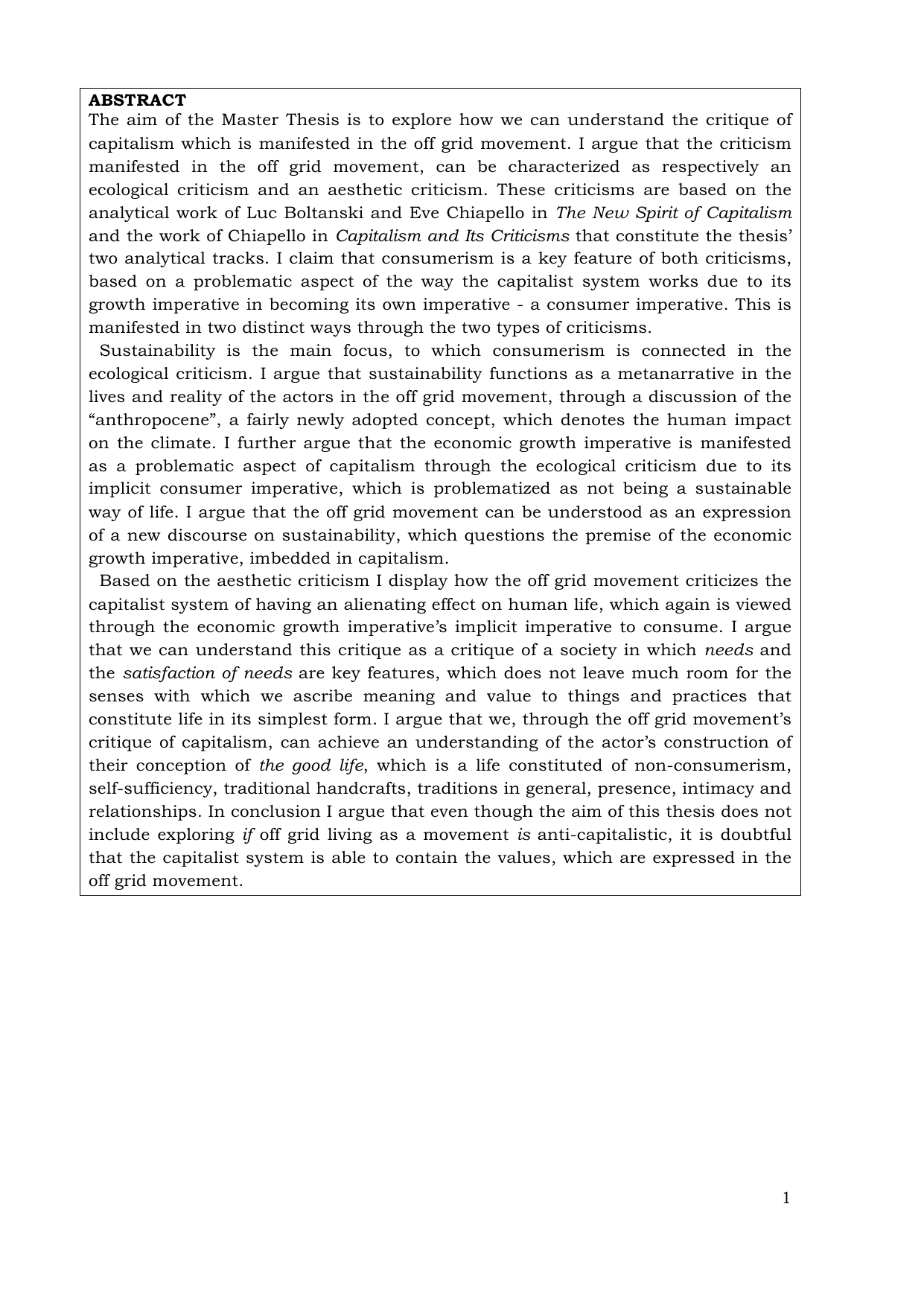
Det moderne menneske i en antropocæn tid: Et filosofisk perspektiv på ”off grid living”
Oversat titel
Modern Man at the Time of the Anthropocene: A Philosophical View on Off Grid Living
Forfatter
Semester
4. semester
Uddannelse
Udgivelsesår
2017
Afleveret
2017-05-29
Antal sider
76
Abstract
The aim of the Master Thesis is to explore how we can understand the critique of capitalism which is manifested in the off grid movement. I argue that the criticism manifested in the off grid movement, can be characterized as respectively an ecological criticism and an aesthetic criticism. These criticisms are based on the analytical work of Luc Boltanski and Eve Chiapello in The New Spirit of Capitalism and the work of Chiapello in Capitalism and Its Criticisms that constitute the thesis’ two analytical tracks. I claim that consumerism is a key feature of both criticisms, based on a problematic aspect of the way the capitalist system works due to its growth imperative in becoming its own imperative - a consumer imperative. This is manifested in two distinct ways through the two types of criticisms. Sustainability is the main focus, to which consumerism is connected in the ecological criticism. I argue that sustainability functions as a metanarrative in the lives and reality of the actors in the off grid movement, through a discussion of the “anthropocene”, a fairly newly adopted concept, which denotes the human impact on the climate. I further argue that the economic growth imperative is manifested as a problematic aspect of capitalism through the ecological criticism due to its implicit consumer imperative, which is problematized as not being a sustainable way of life. I argue that the off grid movement can be understood as an expression of a new discourse on sustainability, which questions the premise of the economic growth imperative, imbedded in capitalism. Based on the aesthetic criticism I display how the off grid movement criticizes the capitalist system of having an alienating effect on human life, which again is viewed through the economic growth imperative’s implicit imperative to consume. I argue that we can understand this critique as a critique of a society in which needs and the satisfaction of needs are key features, which does not leave much room for the senses with which we ascribe meaning and value to things and practices that constitute life in its simplest form. I argue that we, through the off grid movement’s critique of capitalism, can achieve an understanding of the actor’s construction of their conception of the good life, which is a life constituted of non-consumerism, self-sufficiency, traditional handcrafts, traditions in general, presence, intimacy and relationships. In conclusion I argue that even though the aim of this thesis does not include exploring if off grid living as a movement is anti-capitalistic, it is doubtful that the capitalist system is able to contain the values, which are expressed in the off grid movement.
The aim of the Master Thesis is to explore how we can understand the critique of capitalism which is manifested in the off grid movement. I argue that the criticism manifested in the off grid movement, can be characterized as respectively an ecological criticism and an aesthetic criticism. These criticisms are based on the analytical work of Luc Boltanski and Eve Chiapello in The New Spirit of Capitalism and the work of Chiapello in Capitalism and Its Criticisms that constitute the thesis’ two analytical tracks. I claim that consumerism is a key feature of both criticisms, based on a problematic aspect of the way the capitalist system works due to its growth imperative in becoming its own imperative - a consumer imperative. This is manifested in two distinct ways through the two types of criticisms. Sustainability is the main focus, to which consumerism is connected in the ecological criticism. I argue that sustainability functions as a metanarrative in the lives and reality of the actors in the off grid movement, through a discussion of the “anthropocene”, a fairly newly adopted concept, which denotes the human impact on the climate. I further argue that the economic growth imperative is manifested as a problematic aspect of capitalism through the ecological criticism due to its implicit consumer imperative, which is problematized as not being a sustainable way of life. I argue that the off grid movement can be understood as an expression of a new discourse on sustainability, which questions the premise of the economic growth imperative, imbedded in capitalism. Based on the aesthetic criticism I display how the off grid movement criticizes the capitalist system of having an alienating effect on human life, which again is viewed through the economic growth imperative’s implicit imperative to consume. I argue that we can understand this critique as a critique of a society in which needs and the satisfaction of needs are key features, which does not leave much room for the senses with which we ascribe meaning and value to things and practices that constitute life in its simplest form. I argue that we, through the off grid movement’s critique of capitalism, can achieve an understanding of the actor’s construction of their conception of the good life, which is a life constituted of non-consumerism, self-sufficiency, traditional handcrafts, traditions in general, presence, intimacy and relationships. In conclusion I argue that even though the aim of this thesis does not include exploring if off grid living as a movement is anti-capitalistic, it is doubtful that the capitalist system is able to contain the values, which are expressed in the off grid movement.
Emneord
